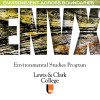Panels
Wednesday afternoon, 3:30-5 p.m.: (Un)natural Disasters
(Un)natural Disasters highlighted social, economic, and political conditions that allow hazards to be transformed into disasters for some communities and not others. We sought to examine sources of differential vulnerability to disaster, as well as uneven patterns of relief, response, and media representation in the wake of disaster. We stimulated discussion about ways that equitable resilience can be pursued at a variety of scales. Finally, we considered both chronic and acute forms of distress, or “disaster,” ranging from homelessness to the impending subduction zone earthquake and related tsunami, within our own local and regional community.
Panelists:
Andrew Bernstein - Lewis & Clark College
Anthony Oliver-Smith - University of Florida
Steven Bullock - Multnomah County
Wednesday evening, 7-8:30 p.m.: Dimensions of Development
Development is commonly presented as an embodiment of progress, a process by which we can help all members of our world rise out of poverty and into equitable prosperity. We work for “development” in all areas of our lives, institutions, cities, countries, and regions of the world without questioning how these very processes can perpetuate or exacerbate pre-existing power dynamics. In this panel, we aimed to examine processes of development and their diverse consequences, ranging from meeting basic needs of impoverished populations to emphasizing uneven racial and power dynamics between the Global North and the Global South.
Panelists:
LaShandra Sullivan - Reed College
Maryann Bylander - Lewis & Clark College
Rocky Rohwedder - Sonoma State University
Rachel Bailey, Sonja Ervin, and Wendy Klein - Central City Concern
Thursday afternoon, 3:30-5 p.m.: Voices and Choices - Perspectives and Priorities in Environmental Movements
Certain voices have been amplified above others in the history of environmentalism. This panel sought to identify gaps in the perspectives and agendas that have characterized mainstream environmental discourse and action. Environmental justice movements have arisen in part to fill some of those gaps. We examined the goals and stakeholders of ‘traditional’ environmental justice movements, and considered which issues, processes, perspectives, and people may still be missing from efforts to shape a more inclusive environmentalism.
Panelists:
Corin La Pointe-Aitchison - Native American Law Students Association
Dayna Jones - Native American Law Students Association
Dianne Glave - Western Pennsylvania Conference Center of the United Methodist Church
Jay Odenbaugh - Lewis & Clark College
Environmental Studies is located in room 343A of John R. Howard Hall on the Undergraduate Campus.
MSC: 62
email envs@lclark.edu
voice 503-768-7790
fax 503-768-7620
Symposium Advisor Jessica Kleiss
Environmental Studies
Lewis & Clark
615 S. Palatine Hill Road MSC 62
Portland OR 97219
